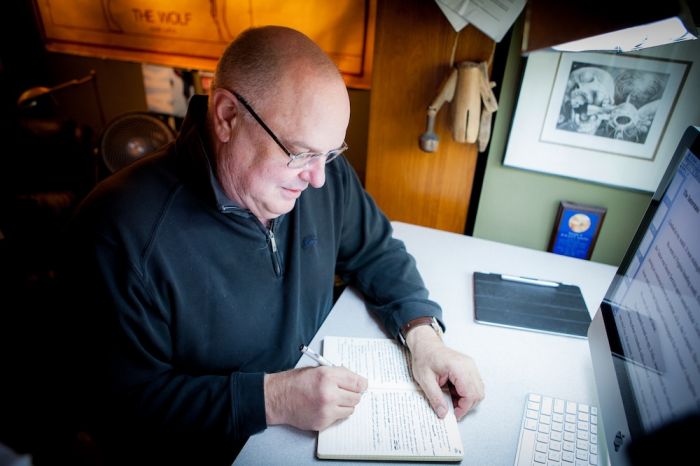Elbows are up in over a project called Jordan Cove, through which, the Canadian energy company, Veresen, would build a large liquid natural gas (LNG) terminal in Coos Bay and an adjoining 230-mile Pacific Connector Pipeline from Malin in southeastern Oregon. The company says the project is a $7.5 billion investment in the area, would provide 150 long-term jobs at a rate above the area average wage, and be a catalyst for more economic development. Opponents see the pipeline as an environmental concern crossing rivers, forests and mountains with the methane terminal as being potentially hazardous in the tsunami and earthquake subduction zones with little long-term benefit for Oregonians. In May, Veresen filed permits with the U.S. Federal Energy Regulatory Commission. It hopes to receive approval within a year and begin construction on the LNG plant in Coos Bay in 2015 and ship its first load of LNG to Asia in 2017.

Francis Eatherington
Conservation Director, Cascadia Wildlands
Veresen is a Canadian company hoping to export its natural gas to Asia via a pipeline and export terminal inOregon. Veresen, and itsU.S.partners, claim this is in the public interest, therefore, they should be given the power of eminent domain over the properties of Oregonians living along the proposed 230-mile pipeline route, and be given the approval to build a massive new industrial plant in Coos Bay to turn gas into liquefied natural gas (LNG) for export.
The LNG terminal would include a marine berth big enough for two huge ocean tankers dug out of the North Spit, two enormous gas storage tanks and a new gas power plant, built on top of unstable sand dunes, in line with the airport runway, in a tsunami and earthquake zone, and near the site of the New Carissa ship wreck. What could possibly go wrong?
This proposal requires serious consideration without the influence of money clouding our judgments. Exporting our domestic natural gas will:
– Extend dependence on foreign oil.
– Delay transition to natural gas for transportation and replacing coal-generated electricity.
– Increase electric bills. Increase gas cooking and heating costs.
– Increase the practice of fracking. This will increase methane releases to the atmosphere, a greenhouse gas twenty times more potent than carbon.
– Send jobs overseas because of higher gas prices.
Finally, the threat of eminent domain onU.S.citizens from a Canadian company is unfair. It takes away the power of citizens to negotiate a fair price for the use of their land. While Veresen stands to make billions of dollars from exporting their gas, they insist on paying landowners only a small, one-time payment.
While Veresen makes strong arguments for corporate profits, we should not just fall in line without considering what is really best for Oregonians and our future.

Michael Hinrichs
Director of Public Affairs for the Jordan Cove Energy Project and the Pacific Connector Gas Pipeline
After nearly a decade, the Jordan Cove Energy Project and Pacific Connector Gas Pipeline are in final permitting. At $7.7 billion, this project will be the largest private investment in Oregon’s history, and will make it possible to export natural gas from the West Coast to our trading partners in Asia. The project will revitalize Southern Oregon’s economy and bring millions of dollars in benefits to Coos, Douglas, Jackson and Klamath counties.
Liquefied Natural Gas is natural gas that has been cooled to -260°F. In liquid form, it can be exported on ships or used to fuel trucks, ships or locomotives. Other countries are eager to sign long-term contracts for part of North America’s natural gas abundance.
But the true value of the project is the benefits for Southern Oregon. Elected officials such as Sen. Arnie Roblan and Rep. Caddie McKeown, both representing Coos Bay, are supporters of the project because of its benefit to build out Southern Oregon’s infrastructure, helping the region attract new business and create new jobs.
During peak construction, Jordan Cove and Pacific Connector will employ more than 3,500 workers, who on average will earn $80,000 per year in salary and benefits. Jordan Cove will create 150 permanent jobs and support the creation of hundreds of other jobs in Coos County. The Pacific Connector Pipeline will increase the availability of natural gas in Southwest Oregon, making the region more competitive in attracting new industries and jobs.
Jordan Cove is seeking approval from the Federal Energy Regulatory Commission and the State of Oregon. An application to export gas is pending with the U.S. Department of Energy. Permit approvals are anticipated in the summer of 2014 with construction beginning in early 2015.







